Ruta de navegación
Menú de navegación
Blogs
Entries with Categories Global Affairs World order, diplomacy and governance .
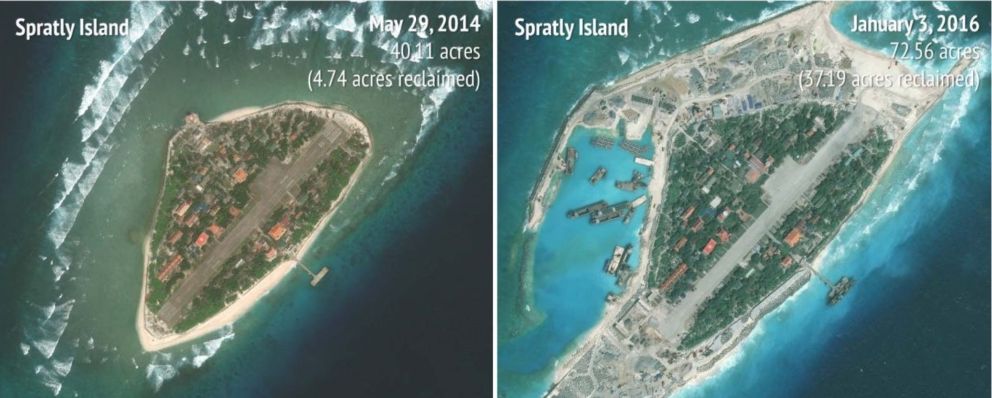
Chinese fortification on disputed small islands [CSIS satellite imagery].
JOURNAL / Fernando Delage
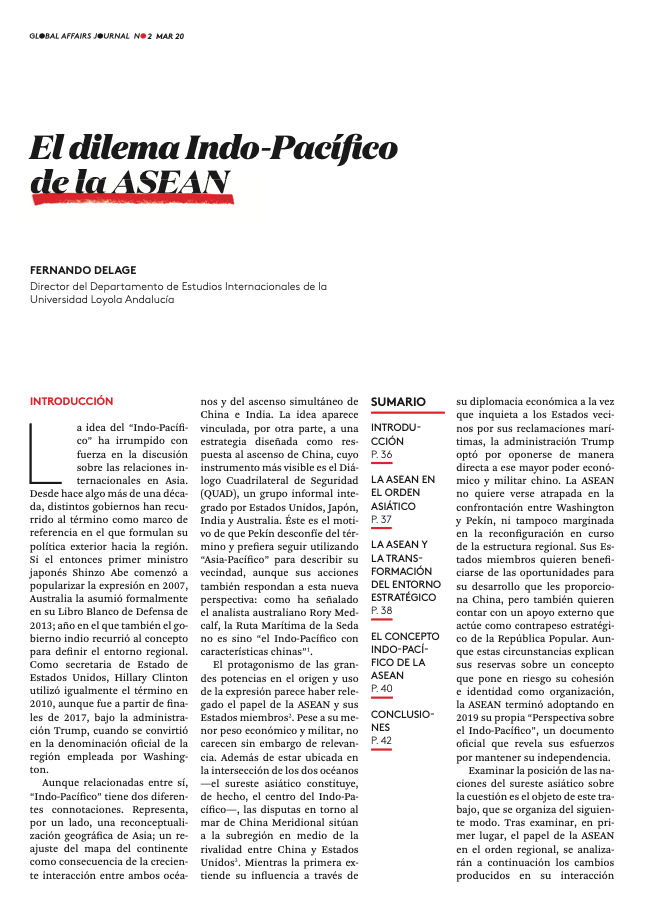 [8-page document. download in PDF].
[8-page document. download in PDF].
INTRODUCTION
The idea of the "Indo-Pacific" has burst into the discussion on International Office in Asia. For a little over a decade now, different governments have used the term as the framework of reference letter in which they formulate their foreign policy towards the region. If the then Japanese Prime Minister Shinzo Abe began to popularise the expression in 2007, Australia formally adopted it in its 2013 Defence White Paper, a year in which the Indian government also resorted to the concept to define the regional environment. As US Secretary of State administrative assistant , Hillary Clinton similarly used the term in 2010, although it was not until late 2017, under the Trump administration, that it became Washington's official name for the region.
Although related, "Indo-Pacific" has two different connotations. It represents, on the one hand, a geographical reconceptualisation of Asia; a re-mapping of the continent as a consequence of the growing interaction between the two oceans and the simultaneous rise of China and India. The idea is also linked to a strategy designed in response to China's rise, the most visible instrument of which is the Quadrilateral Security Dialogue (QUAD), an informal group comprising the United States, Japan, India and Australia. This is why Beijing is wary of the term and prefers to continue to use "Asia-Pacific" to describe its neighbourhood, even if its actions also respond to this new perspective: as Australian analyst Rory Medcalf has pointed out, the Maritime Silk Road is nothing more than "the Indo-Pacific with Chinese characteristics".
The prominence of the major powers in the origin and use of the term seems to have relegated the role of ASEAN and its member states. Despite their lesser economic and military weight, they are not without relevance. In addition to being located at the intersection of the two oceans - Southeast Asia is, in fact, the centre of the Indo-Pacific - disputes over the South China Sea place the sub-region in the midst of the rivalry between China and the United States. While the former extends its influence through economic diplomacy while unsettling neighbouring states over their maritime claims, the Trump administration has chosen to directly oppose China's increased economic and military power. ASEAN does not want to be caught up in the confrontation between Washington and Beijing, nor does it want to be marginalised in the ongoing reconfiguration of the regional structure. Its member states want to benefit from the opportunities that China provides for their development but also want external support to act as a strategic counterweight to the People's Republic. Although these circumstances explain its reservations about a concept that puts its cohesion and identity as an organisation at risk, ASEAN ended up adopting its own 'Indo-Pacific Perspective' in 2019, an official document that reveals its efforts to maintain its independence.
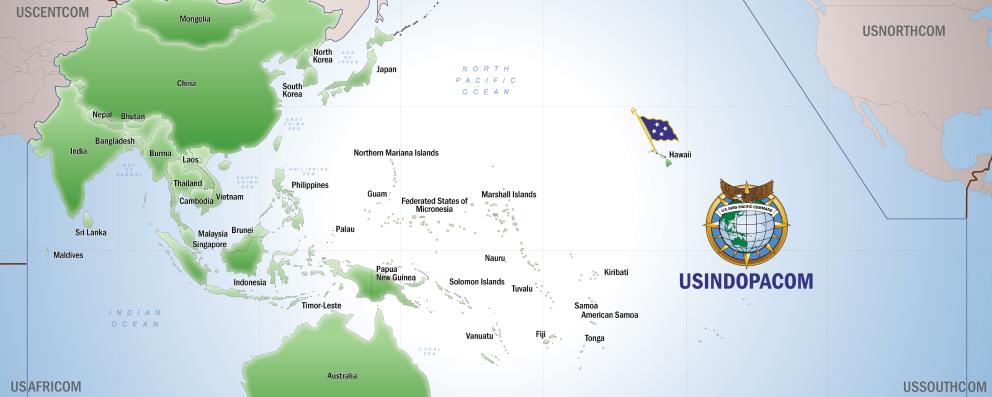
Map of the US Pentagon's Indo-Pacific Command area skill [USINDOPACOM].
JOURNAL / Juan Luis López Aranguren
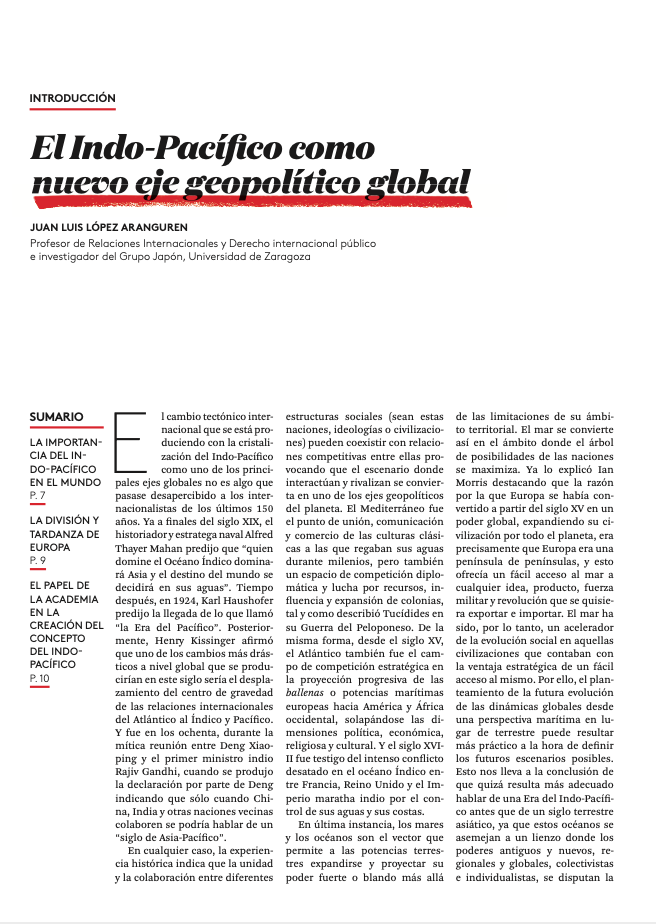 [6-page document. download in PDF].
[6-page document. download in PDF].
INTRODUCTION
The international tectonic shift that is taking place with the crystallisation of the Indo-Pacific as a major global axis is not lost on internationalists over the past 150 years. As early as the late 19th century, naval historian and strategist Alfred Thayer Mahan predicted that "whoever dominates the Indian Ocean will dominate Asia and the fate of the world will be decided in its waters". Later, in 1924, Karl Haushofer predicted the coming of what he called "the Pacific Age". Later, Henry Kissinger asserted that one of the most dramatic global changes to occur in this century would be the shift of the centre of gravity of the International Office from the Atlantic to the Indian and Pacific Oceans. And it was in the 1980s, during the legendary meeting between Deng Xiaoping and Indian Prime Minister Rajiv Gandhi, that Deng made the statement that only when China, India and other neighbouring nations work together can we speak of an "Asia-Pacific century".
In any case, historical experience indicates that unity and partnership between different social Structures (be they nations, ideologies or civilisations) can coexist with competitive relations between them, causing the scenario where they interact and compete to become one of the geopolitical axes of the planet. The Mediterranean was the point of union, communication and trade of the classical cultures to which its waters irrigated for millennia, but also a space of diplomatic competition and struggle for resources, influence and expansion of colonies, as Thucydides described in his Peloponnesian War. Similarly, from the 15th century onwards, the Atlantic was also the field of strategic competition in the progressive projection of the European whales or maritime powers towards America and West Africa, with political, economic, religious and cultural dimensions overlapping. And the 18th century saw intense conflict in the Indian Ocean between France, the United Kingdom and the Indian Maratha Empire for control of its waters and coasts.
Ultimately written request, the seas and oceans are the vector that allows terrestrial powers to expand and project their hard or soft power beyond the limitations of their territorial scope. The sea thus becomes the realm where the tree of possibilities of nations is maximised. Ian Morris has already explained this by pointing out that the reason why Europe had become a global power from the 15th century onwards, expanding its civilisation all over the planet, was precisely because Europe was a peninsula of peninsulas, and this offered easy access to the sea for any idea, product, military force and revolution to be exported and imported. The sea has therefore been an accelerator of social evolution in those civilisations that had the strategic advantage of easy access to it. Therefore, looking at the future evolution of global dynamics from a maritime rather than a terrestrial perspective may be more practical in defining possible future scenarios. This leads us to the conclusion that it is perhaps more appropriate to speak of an Indo-Pacific Age rather than an Asian land century, as these oceans resemble a canvas where old and new, regional and global, collectivist and individualist, powers vie for the projection of their interests, spheres of influence and identities to global reach.
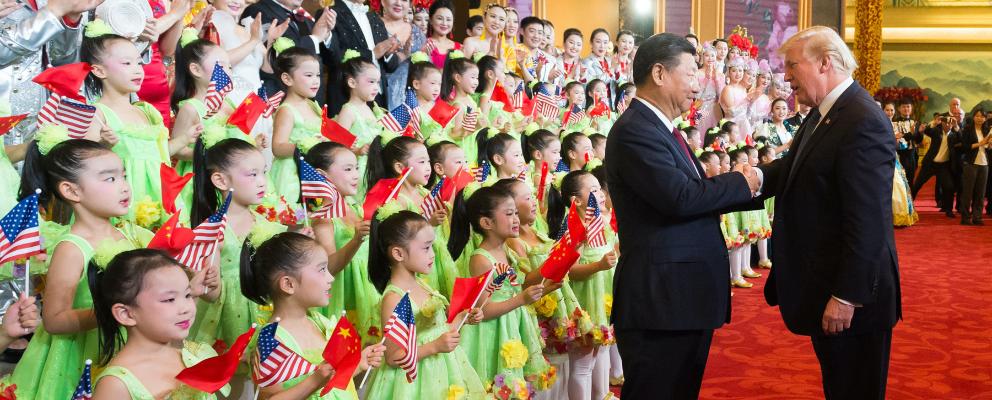
visit Xi and Trump during the US president's only visit to China, in 2017 [White House] [White House].
JOURNAL / Florentino Portero
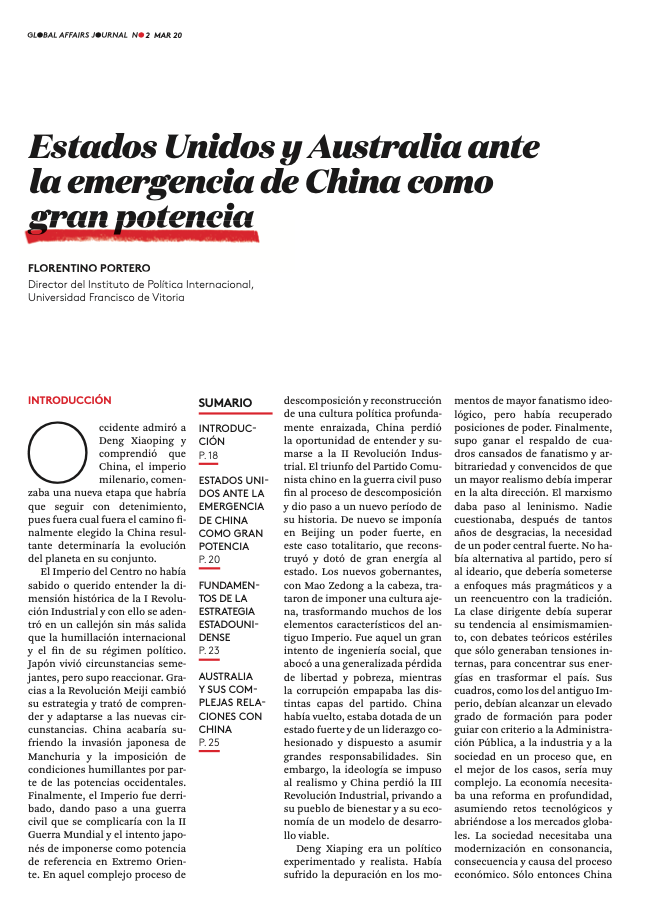 [10-page document. download in PDF].
[10-page document. download in PDF].
INTRODUCTION
The West admired Deng Xiaoping and realised that China, the millenary empire, was entering a new phase that would have to be followed closely, for whatever path was finally chosen, the resulting China would determine the evolution of the planet as a whole.
The Central Empire had been unable or unwilling to understand the historical dimension of the First Industrial Revolution and had thus entered an impasse with no way out other than international humiliation and the end of its political regime. Japan experienced similar circumstances, but was able to react. Thanks to the Meiji Revolution, it changed its strategy and tried to understand and adapt to the new circumstances. China would eventually suffer the Japanese invasion of Manchuria and the imposition of humiliating conditions by the Western powers. Eventually, the Empire was toppled, giving way to a civil war that would be complicated by World War II and the Japanese attempt to impose itself as the power of reference letter in the Far East. In that complex process of decomposition and reconstruction of a deeply rooted political culture, China missed the opportunity to understand and join the Second Industrial Revolution.
The victory of the Chinese Communist Party in the civil war put an end to the process of decomposition and ushered in a new period in its history. Once again, a strong, in this case totalitarian, power was imposed in Beijing, which rebuilt and energised the state. The new rulers, led by Mao Zedong, tried to impose an alien culture, transforming many of the characteristic elements of the old Empire. It was a grand attempt at social engineering, which led to widespread loss of freedom and poverty, while corruption permeated the various layers of the party. China was back, endowed with a strong state and a cohesive leadership willing to take on great responsibilities. However, ideology won out over realism and China lost the Third Industrial Revolution, depriving its people of welfare and its Economics of a viable model of development .
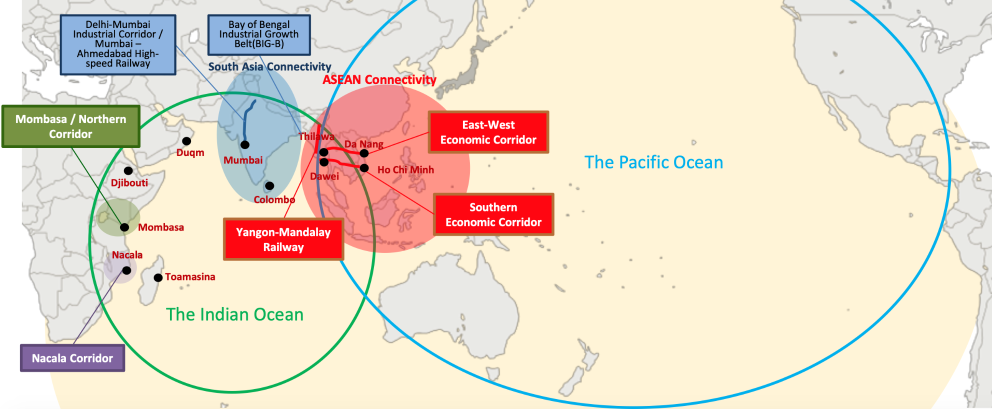
Map of the Japanese vision of the Free and Open Pacific [MoFA].
JOURNAL / Carmen Tirado Robles
 [8-page document. download in PDF].
[8-page document. download in PDF].
INTRODUCTION
The concept of the Free and Open Indo-Pacific (FOIP) is said to date back to article by Indian naval officer Captain Gurpreet Khurana, who first wrote about this geopolitical concept in early 2007, in a paper graduate "Security of Sea Lines: Prospects for India-Japan Cooperation". At that time, the free and open Indo-Pacific was primarily a geographical concept describing the maritime space stretching from the East African and West Asian littorals, across the Indian Ocean and the western Pacific Ocean to the East Asian coasts. At the same time, Japanese Prime Minister Shinzo Abe presented his foreign policy plan based on democratic values from which he proposed "I will engage in strategic dialogues at the leader's level with countries that share fundamental values such as Australia and India, with a view to widening the circle of free societies in Asia as well as in the world", which together with the consolidation of relations with the United States ("The times demanded that Japan shift to proactive diplomacy based on new thinking. I will demonstrate the 'Japan-U.S. Alliance for Asia and the World' even further, and to promote diplomacy that will actively contribute to stalwart solidarity in Asia"), creates the concept of the Quadrilateral or Quad, as opposed to a Sino-centric view of Asia.
The idea of the Quad joins the FOIP when Abe, in August 2007, in his speech before the Indian Parliament, built on the "Confluence of the Indian and Pacific Oceans" and "the dynamic coupling as seas of freedom and prosperity" of Asia's largest geographical region and later on, in his second term, he presented the new Indo-Pacific geopolitical framework at the 6th Tokyo lecture on development Africa, which took place in Nairobi (Kenya) on 27 August 2016 (TICAD VI).
[Alyssa Ayres, Our Time Has Come. How India Is Making Its Place in the World (Oxford University Press: Oxford, 2020) 360 pgs].
review / Alejandro Puigrefagut
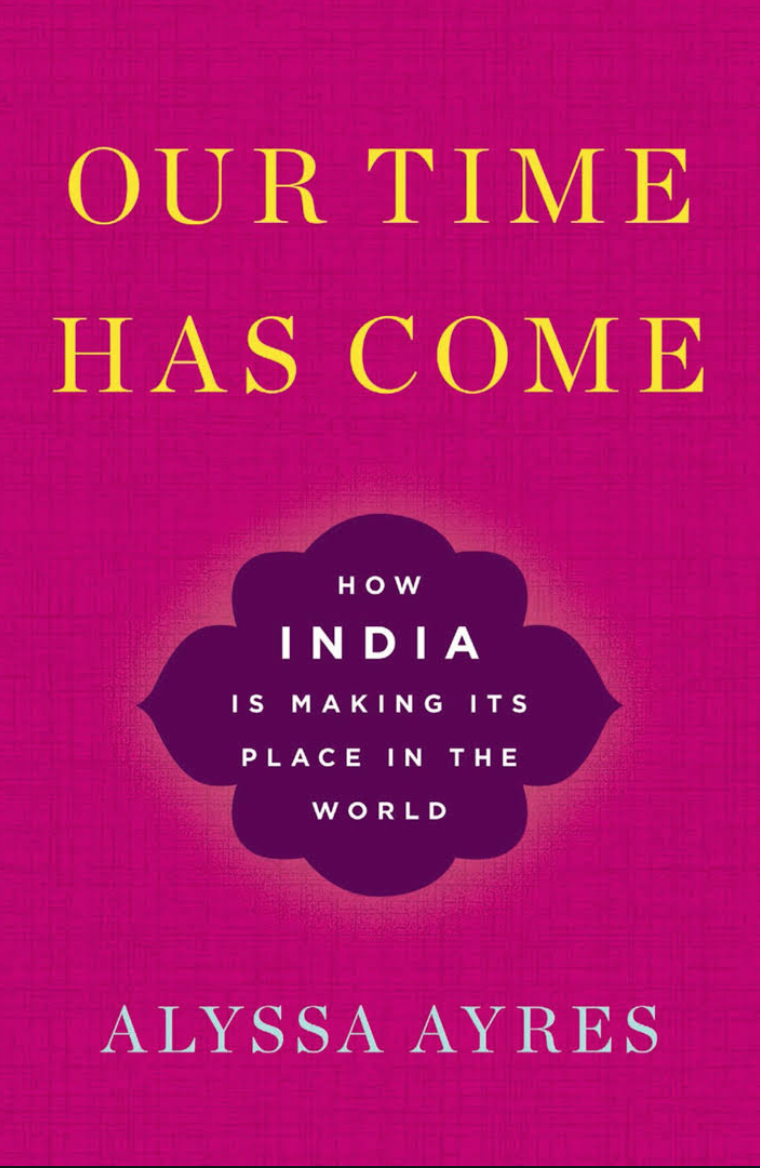
A progressively rising India wants to occupy a prominent place among the global powers. In recent decades, discussions about India's global rise and place in the world have been on the rise, sometimes in the context of possible alliances to counter China's excessive dominance.
Alyssa Ayres, an expert on India, Pakistan and South Asia at the US Council on Foreign Relations, reflects well in her book Our Time Has Come. How India Is Making Its Place in the World, the role this democracy plays internationally, the obstacles it continues to face, and the implications of its rise for the United States and other countries in the Indo-Pacific region, such as Pakistan and China. It is fair to say that India's economic expansion has placed it among the world's leading emerging powers, but it now wants to move forward and gain a place among the global powers.
To fully understand India's global role, the author analyses its internal political, economic and social realities. India is the world's largest democracy, encompassing a wide range of national and regional parties that advocate radically different policies. This creates complications in reaching agreements that benefit large parts of the population. In addition, other factors complicating the relationship between the population are social division and religion. To begin with, India has a serious problem of social division caused by the distinction between social classes, or castes, some of which continue to play a major role in decision-making. Religion also plays an important role due to the large number of religions that coexist in India; however, the Hindu and Muslim majorities are the ones that mark the political diary .
Ayres highlights two characteristics that shape India's position in the world today: India's self-perception as a country at development and its abstention from global entanglements. According to the author, despite India's emergence as one of the world's largest economies, it continues to have a domestic perception of itself as a country doomed to always be among the nations at development. This results in domestic economic policies that hold back and hinder international ambitions and are thus in continuous conflict. On the other hand, India has historically stayed out of major global issues and international blocs with its policy of non-alignment.
Our Times Has Come, while defending India's high standing in the international system, also underlines the major challenges India faces for not having abandoned its old policies. Firstly, the Economics is still very much protectionist and there is no clear consensus on the new contributions that a more open market Economics could bring. Second, India continues to struggle with the bequest of its non-alignment foreign policy and remains ambivalent about how it should exercise its power in multilateral institutions. And third, India remains overly protective of its autonomy, seeking to shape its international interactions on Indian terms. Hence, India tends to move cautiously and deliberately in the international sphere.
On the other hand, the book emphasises India-US relations. The interaction between the two countries differs from their relations with other states in that New Delhi, while seeking a closer strategic and economic relationship with the US, does not want to be bound by the obligations inherent in this alliance, but rather to acquire authority without having to bow to Washington.
Ayres emphasises the need to reform global governance to create a specific space for New Delhi. His recommendations include support for India's membership of the UN Security committee and other institutions that establish global economic and security diary . It is clear that India, as a rising power, should be better understood and appreciated on its own terms. In other words, New Delhi should acquire a more pivotal role in the international arena and take some leadership to avoid being squeezed by its direct regional and global competitors.
The pages of Our Times Has Come provide several years of knowledge and first-hand study of India's foreign policy, revealing its complexities and the major characteristics that shape it. Through this book, scholar Alyssa Ayres offers us an indispensable analysis to understand what India is, but more importantly, what it wants to become.
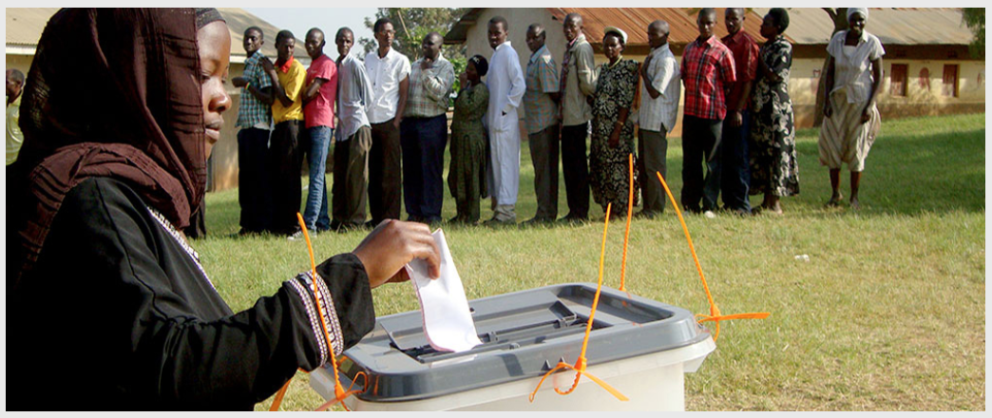
COMMENTARY / Norman Sempijja
When President Yoweri Museveni came to power in 1986, he oversaw a reset of Ugandan politics for the next 35 years. He outlawed parties and formed a movement system which although has sometimes been described as a one-party state was crucial in bringing all groups on board to chart the way forward for a country that had been ravaged by misrule and conflict for almost 20 years.
Fast forward 2021, we are faced with a slightly different situation but of likely grave consequences. Uganda is in the middle of a stand-off between President Museveni and his challenger Mr Robert Kyagulanyi (also known as Bobi Wine). The issue relates to the outcome of the 2021 presidential election which although was held in a very peaceful manner had gross vote-counting irregularities. The Uganda electoral commission gave Museveni 58.6% and Kyagulanyi 34.8%. On the other hand, the tallying centres set up by Kyagulanyi's team using the Uvote app where declaration forms were uploaded once counting was done have so far given Kyagulanyi 71% and Museveni around 25% of the vote. Vote counting is still ongoing. With Kyagulanyi unlikely to concede Museveni decided to put him under house arrest to prevent him from leading mass protests. The internet was also switched off for 5 days and at the moment social average can only be accessed through the use of VPN services.
Amid this melee is Covid-19 virus rampaging through the country. The health services are still not fully prepared to deal with a massive outbreak and although the lockdown has been eased, the economic impact will be felt for years. For a country that is largely agro-based and relies heavily on the informal sector, the impact has been dire on the already struggling population. Secondly, a worrying trend has emerged internationally where various variants of the Covid virus have been registered. For example, we have new covid-19 strains in the United Kingdom, South Africa, Brazil and Japan for now. Thus, questions have lingered about the effectiveness of the current vaccines in circulation to combat these new variants. But that is beside the point. Uganda has not secured any of the vaccines yet.
Therefore, Museveni as head of state faces a difficult situation. Does he pour the meagre resources at his disposal to contain Kyagulanyi? Or does he negotiate with him to chart a way forward out of this debilitating situation? Obviously, in trying to answer these questions he will have to weigh the cost-benefits to the solutions and gauge if they fit in his diary.
So, let us imagine Museveni throws all his resources at containing Kyagulanyi. Well, he will have to curtail social average especially as it was crucial to ending former Egyptian president Hosni Mubarak. It is that powerful. But we should note that the internet is hard to police and is a medium through which a lot of people make a living. Either way patience will run out for the people whose livelihoods will be curtailed in the process. They will have no option but to organise protests. The bad news for Museveni is that according to African Union brief on the Sahel 2020 it is clear that violent clashes and violence against civilians are on the rise during these covid-19 times. If we mirror that with the November riots in Uganda, we are likely to see more protests if the heavy-handed policies of the state are continuously applied.
Museveni will also have to maintain Kyagulanyi under house arrest, but he will further draw the ire of the international community as his current gambit on the elections was a stretch too far. He may have burnt up his remaining currency with several international stakeholders. Apart from Western societies, citizens in different African countries have grown tired of Museveni and are pressuring their countries not to acknowledge his electoral win. This exasperation is among the young people especially in Kenya, Malawi, Nigeria and South Africa to mention but a few.
A combination of continental and international loss of support could set Uganda the same path as Zimbabwe under Mugabe if Museveni resorts to outright violence. We could see sanctions being applied on top of the travel restrictions already imposed on key players within Museveni's government. The problem for Museveni is Uganda does not possess strong support in East Africa as Mugabe did in Southern Africa. Plus, Museveni's relationship with President Kagame has been frosty, to say the least. Either way, he will have to deal with mass protests in support of freedom for Kyagulanyi in Uganda. This will call for further investment in the police and army to contain the situation. Let us not forget that with the fluid nature of Covid-19 pandemic, the country could face deep human security issues. Hence containing Kyagulanyi will come at a very political and economic cost both to Museveni and Uganda.
What if Museveni decided to negotiate with Kyagulanyi and form a government of national unity? This wouldn't be without precedent as Museveni set into place the movement system discussed earlier that brought everyone on board and for 10 years the country benefited from collective governance (except the north which was experiencing an insurgency). I'm of the persuasion that Uganda is again on similar footing. Institutions have been degraded and cannot perform independently. There is a lot of frustration with the current regime as exemplified by the parliamentary elections where the vice president and 24 ministers lost their seats. By inviting Kyagulanyi onboard Museveni will be pressing the reset button especially as he will inject young people into the system, and they could play a key role in reducing corruption and improving service delivery.
It would cost Museveni some political capital among the entrenched supporters, but it will save his legacy. He will be seen as a father of a nation mentoring young leaders to take over from him. Right now, he is seen as an insensitive, power-hungry despot. But that could change in an instant if he goes for a coalition with Kyagulanyi and other leaders like Mugisha Muntu, Nobert Mao and Patrick Amuriat. The resources that would have been spent on containing them would be allocated to the heavily challenged health care system to combat Covid-19 and other ailments.
Moreover, this will save the National Resistance Movement political party from oblivion once Museveni goes. The reason for this is the party has struggled to attract a strong intellectual and ideological talent within its ranks as it has been accused of nepotism. This would be a good time to reset the party and its structures and prepare for the transition from Museveni. By co-opting the opposition into government this will put them under scrutiny and any blunders they make will further give NRM a softer landing come 2026.
The benefit for Kyagulanyi would be experience in government. Although he was a member of parliament, gaining further experience in public governance would do him a lot of good and also build a strong support base within the country. Since his political party has the largest number of opposition members of parliament this will give him further credibility and foundation to strengthen his National Unity platform party (NUP). The same will apply for the Alliance for National Transformation (ANT) led by Mugisha Muntu. The other parties like Forum for Democratic Change (led by Patrick Amuriat) and Democratic Party (led by Nobert Mao) will get a new lease of life.
Therefore, due to the circumstances afoot, it would be of immense political worth to form a government of national unity under the leadership of President Yoweri Museveni but with considerable influence of the other parties especially the National Unity Platform, Alliance for National Transformation, Democratic Party and Forum for democratic Change. This will pause the political animosity as the country goes into reforms to ensure more transparent electoral and governance processes.
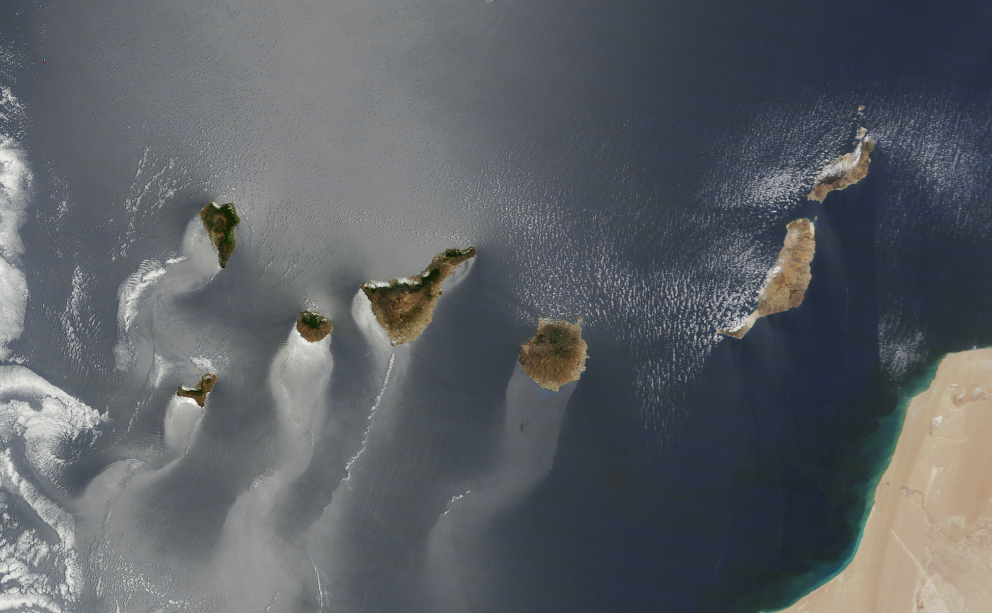
Satellite image of the Canary Islands [NASA].
COMMENTARY / Natalia Reyna Sarmiento
The global pandemic caused by Covid-19 has forced quarantines and other restrictions around the world and this has severely limited the movement of people from one country to another. Nevertheless, the migration phenomenon has continued, including in the case of Europe, where the closure of borders for part of 2020 has not prevented illegal immigration, such as from sub-Saharan Africa. In fact, the health misery of poor countries has added another reason for flight from the countries of origin in this time of pandemic.
The increase in migration in recent decades has been a consequence of various humanitarian challenges. Lack of security, fear of persecution, violence, conflict and poverty, among other reasons, generate a status of vulnerability that in many cases pushes those suffering from these circumstances to leave their country in search of better conditions. The emergence of Covid-19 has been another element of vulnerability in societies with scarce medical resources in the last year as well, while the arrival of migrants without knowing whether or not they were carriers of the virus has aggravated social resistance to immigration in developed economies. The two issues went hand in hand especially in the migration crisis experienced by the Canary Islands throughout 2020, particularly in the last few months.
Fourteen years after the "cayuco crisis", the archipelago experienced another boom in the arrival of migrants (this time the term that has become generalised for their boats is pateras) B . In 2020, more than 23,000 immigrants arrived in the Canary Islands, in crossings that claimed the lives of at least 600 people. If in 2019 around 100 boats with illegal immigrants arrived in the islands, in 2020 there were more than 550, which speaks of a migration phenomenon multiplied by five.
Why has this increase occurred, redirecting to the Canary Islands a flow that has previously sought the Mediterranean route? On the one hand, the sea crossing continues to be the preferred way to reach Europe, as in addition to the cost of the airfare - prohibitive for many - flights require documentation that is often not in possession or that facilitates a control by the authorities - on departure and arrival - that one wishes to avoid. status On the other hand, the difficulties at points along the Mediterranean route, such as stricter policies imposed by Italy on Admissions Office refugees rescued from the sea, or the war in Libya, where routes arrive from Sudan, Nigeria and Chad, for example, have led to part of the pressure from the migratory mafias towards the Canary Islands. Morocco's attitude may also have played a role in this.
Spain has an interest in maintaining a good relationship with Morocco for obvious reasons. Its border with Ceuta and Melilla and its proximity to the Canary Islands make it a neighbour that can contribute both to security and to intensifying migratory pressure on Spanish territory. Precisely at a critical moment in the Canary Islands crisis, the Spanish Interior Minister, Fernando Grande-Marlaska, visited the neighbouring country on 20 November to meet with his Moroccan counterpart, Abdelouafi Laftit, with the intention of requesting the Alawi monarchy's financial aid to put a stop to the migratory crisis. However, although in the following days there was a decrease in the number of arrivals of small boats in the Canary Islands, arrivals were soon on the rise again, leaving Marlaska's visit effective.
On the other hand, in the same weeks, Pablo Iglesias, vice-president of the Spanish government and University Secretary of Podemos, called on Morocco to hold a referendum on the future of Western Sahara, a former Spanish colony under Moroccan tutelage admitted by the UN until the holding of enquiry for the Sahrawi people. The Admissions Office in those same days of Morocco's sovereignty over Western Sahara by the Trump Administration (in exchange for the establishment of diplomatic relations between Morocco and Israel) led Rabat to expect a revision of Spain's position, which is aligned with the UN's approach. The ratification of this by Iglesias and above all his tone of demand led the Moroccan monarch, Mohammed VI, to decide not to receive the Spanish prime minister, Pedro Sánchez, on a trip to the neighbouring country. Other issues, such as Morocco's delimitation of territorial waters in January, expanding its exclusive economic zone, have increased the disagreements between the two countries.
In addition to the normal tension in the Canary Islands due to the arrival of thousands of immigrants in a short period of time, there were also health risks due to the pandemic. Beyond the fears spread by some about the possible entrance of people actually infected with the coronavirus, the protocols established obliged those arriving in small boats to be kept isolated, which caused a problem of overcrowding in facilities that were initially unsuitable.
The Spanish Red Cross set up areas reserved for the isolation of people who tested positive for Covid-19. In addition, temporary macro-camps were set up to rehouse thousands of migrants who were first housed in different hotels. The transfer of groups of migrants by plane to points on the peninsula created controversy that the government had to deal with. The entrance of 2021 has, at least momentarily, eased the pressure.
The inclusion of private investment and the requirement of efficient credits differ from the overwhelming amount of loans from Chinese state banks.
The active role of China as lender to an increasing number of countries has forced the United States to try to compete in this area of "soft power". Until last decade the US was clearly ahead of China in official development assistance, but Beijing has used its state-controlled banks to pour loans into ambitious projects worldwide. In order to better compete with China, Washington has created the US International Development Finance Corporation (USIDFC), combining the US Overseas Private Investment Corporation (OPIC) and with USAID's Development Credit Authority (DCA).
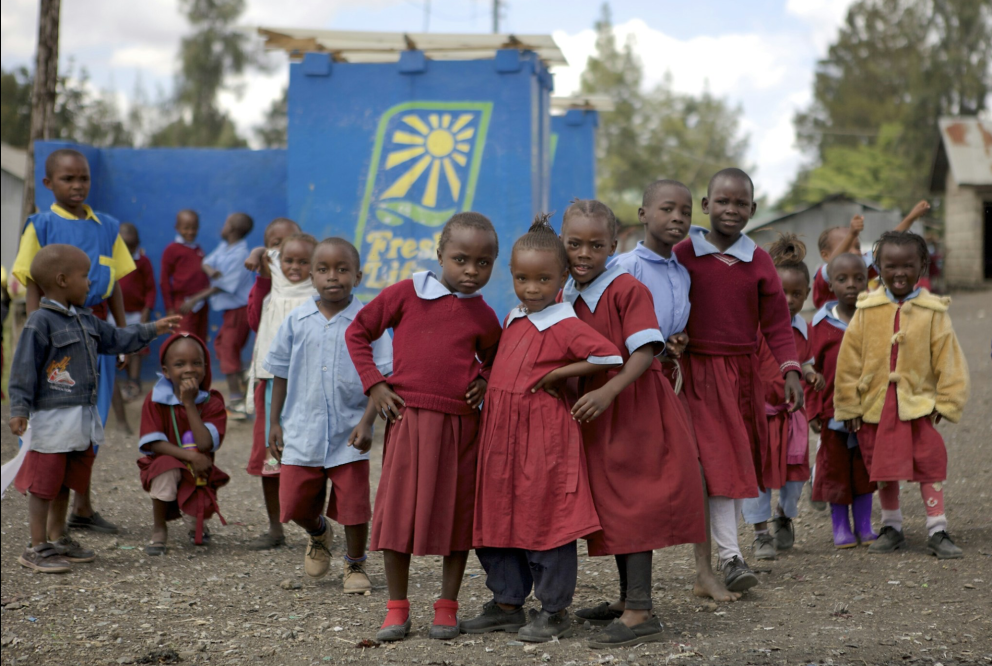
▲ The US agency helped to provide clean, safe, and reliable sanitation for more than 100,000 people in Nairobi, at the end of 2020 [USIDFC].
ARTICLE / Alexandria Casarano
It is not easy to know the complete amount of the international loans given by China in recent years, which skyrocketed from the middle of last decade. Some estimates say that the Chinese state and its subsidiaries have lent about US$ 1.5 trillion in direct loans and trade credits to more than 150 countries around the globe, turning China into the world's largest official creditor.
The two main Chinese foreign investment banks, the Export-Import Bank of China and the China Development Bank, were both established in 1994. The banks have been criticised for their lack of transparency and for blurring the lines between official development assistance (ODA) and commercial financial arrangements. To address this issue, Beijing founded the China International Development Cooperation Agency (CIDCA) in April of 2018. The CIDCA will oversee all Chinese ODA activity, and the Chinese Ministry of Commerce will oversee all commercial financial arrangements going forward.
An additional complaint about Chinese foreign investment concerns "debt-trap diplomacy." Since the PRC first announced its "One Belt One Road" initiative in 2013, the Chinese government has steadily increased its investment in the developing world even more dramatically than it had in the early 2000's (when Chinese foreign aid was increasing annually by approximately 14%). At the 2018 China-Africa Convention Forum, the PCR pledged to invest US$ 60 billion in Africa that year alone. The Wall Street Journal said of the PRC in 2018 that it was "expanding its investments at a pace some consider reckless." Ray Washburn, president of the US Overseas Private Investment Corporation (OPIC), called the Chinese One Belt One Road initiative a "loan-to-own" program. In 2018, this was certainly the case with the Chinese funded Sri Lankan port project, which led the Sri Lankan government to lease the port to Beijing for a 99-year period as a result of falling behind on payments.
OPIC, founded in 1971 under the Nixon administration, was recommended for elimination in the Trump administration's 2017 budget. However, following the beginning of the US-China trade war in 2018, Washington reversed course completely. President Trump's February 2018 budget recommended increasing OPIC's funding and combining it with other government programs. These recommendations manifested themselves in the Better Utilization of Investment Leading to Development (BUILD) Act, which was passed by Congress on October 5, 2018. The Center for Strategic and International Studies (CSIS) called the BUILD Act "the most important piece of U.S. soft power legislation in more than a decade."
The US International Development Finance Corporation
The principal achievement of the BUILD Act was the creation of the US International Development Finance Corporation (USIDFC), which began operation as an independent agency on December 20, 2019. The BUILD Act combined OPIC with USAID's Development Credit Authority to form the USIDFC and established an annual budget of US$ 60 billion for the new organisation, which is more than double OPIC's 2018 budget of US$ 29 billion.
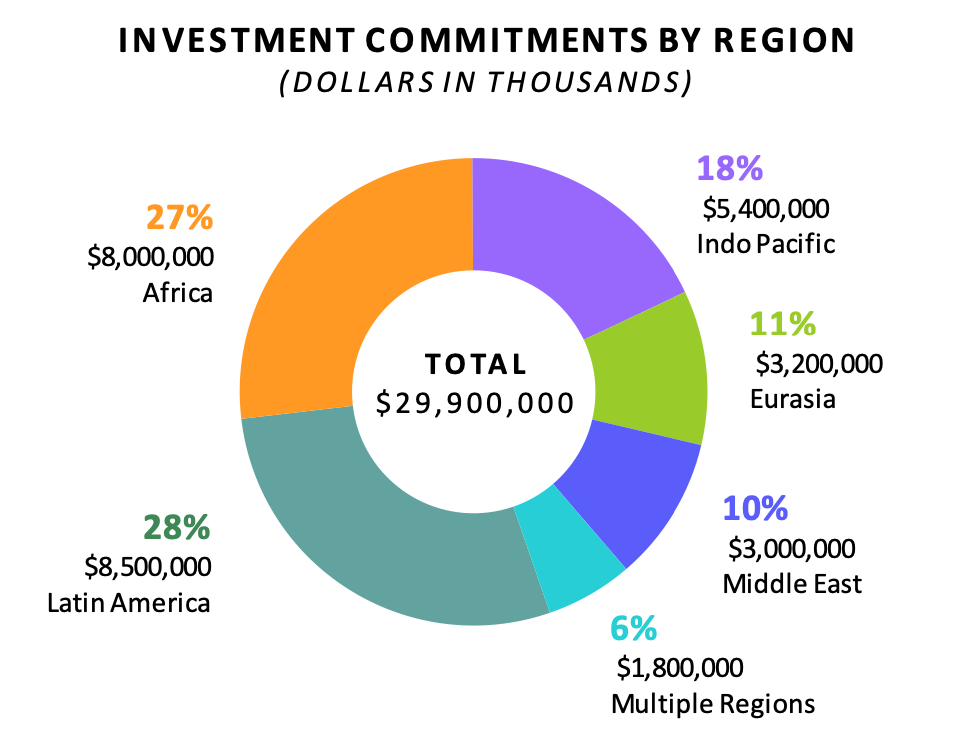
USIDFC's investment commitments by region for the FY 2020. The US$ 29.9 billion is only a fraction of the agency's budget [USIDFC].
According to the Wall Street Journal, OPIC "has been profitable every year for the last 40 years and has contributed US$ 8.5 billion to deficit reduction," a financial success which can primarily be attributed to project management fees. As of 2018, OPIC managed a portfolio valued at US$ 23 billion. OPIC's strong fiscal track record, combined with both the concept of government program streamlining and the larger context of geopolitical competition with China, generated bipartisan support for the BUILD Act and the USIDFC.
The USIDFC has several key new capacities which OPIC lacked. OPIC's business was limited to "loan guarantees, direct lending and political-risk insurance," and suffered under a "congressional cap on its portfolio size and a prohibition on owning equity stakes in projects". The USIDFC, however, is permitted under the BUILD Act to "acquire equity or financial interests in entities as a minority investor."
Both the USIDFC currently and OPIC before its incorporation are classified as Development Finance Institutions (DFIs). DFIs seek to "crowd-in" private investment, that is, attracting private investment that would not occur otherwise. This differs from the Chinese model of state-to-state lending and falls in line with traditional American political and economic philosophy. According to the CSIS, "The USIDFC offers [...] a private sector, market-based solution. Moreover, it fills a clear void that Chinese financing is not filling. China does not support lending to small and medium-sized enterprises (SMEs), and it rarely helps local companies in places like Africa or Afghanistan grow".
In the fiscal year of 2020, the most USIDFC's investments were made in Latin America (US$ 8.5 billion) and Sub-Saharan Africa (US$ 8 billion). Lesser but still significant investments were made in the Indo-Pacific region (US$ 5.4 billion), Eurasia (US$ 3.2 billion), and Middle East (US$ 3 billion). This falls in line with the USIDFC's goal to invest more in lower and lower-middle income countries, as opposed to upper middle countries. OPIC previously had fallen into the pattern of investing predominantly in upper-middle countries, and while the USIDFC is still legally authorised to invest in upper-middle income countries for national security or developmental motives.
These investments serve to further US national interests abroad. According to the USIDFC webpage, "by generating economic opportunities for citizens in developing countries, challenges such as refugees, drug-financed gangs, terrorist organisations, and human trafficking can all be addressed more effectively". Between 2002 and 2014, financial commitments in the DFI sector have increased sevenfold, from US$ 10 billion to US$ 70 billion. In our increasingly globalized world, international interests increasingly overlap with national interests, and public interests increasingly overlap with private interests.
Ongoing USIDFC initiatives
The USIDFC has five ongoing initiatives to further its national interests abroad: 2X Women's Initiative, Connect Africa, Portfolio for Impact and Innovation, Health and Prosperity, and Blue Dot Network. In 2020, the USIDFC "committed to catalyzing an additional US$ 6 billion of private sector investment in global women's economic empowerment" by joining the 2X Women's Initiative which seeks global female empowerment. About US$1 billion for this US$ 6 billion commitment has been specially pledged to Africa. Projects that fall under the 2X Women's Initiative include equity financing for a woman-owned feminine hygiene products online store in Rqanda, and "expanding women's access to affordable mortgages in India".
Continuing the USIDFC's special focus on Africa follows the Connect Africa initiative, under which the USIDFC has pledged US$ 1 billion to promote economic growth and connectivity in Africa. The Connect Africa initiative involves investment in telecommunications, internet access, and infrastructure.
Under the Portfolio for Impact and Innovation initiative, the USIDFC has dedicated US$ 10 million to supporting early-stage businesses. This includes sponsoring the Indian company Varthana, which offers affordable online learning for children whose schools have been shut down due to the Covid-19 crisis.
The Health and Prosperity initiative focuses on "bolstering health systems" and "expanding access to clean water, sanitation, and nutrition". Under the Health and Prosperity initiative, the USIDFC has dedicated US$ 2 billion to projects such as financing a 200+ mile drinking water pipeline in Jordan.
The Blue Dot Network initiative, like the Connect Africa initiative, also invests in infrastructure, but on a global scale. The Blue Dot Network initiative differs from the aforementioned initiatives in being a network. Launched in November 2019, the Blue Dot Network seeks to align the interests of government, private enterprise, and civil society to facilitate the successful development of infrastructure around the globe.
It is important to note that these five initiatives are not entirely separate. Many projects fall under several initiatives at once. The Rwandan feminine products e-store project, for example, falls under both the 2X Women's initiative and the Health and Prosperity initiative.
[Rory Medcalf, Indo-Pacific Empire. China and the Contest for the World's Pivotal Region (Manchester: Manchester University Press, 2020) 310 pp].
review / Salvador Sánchez Tapia
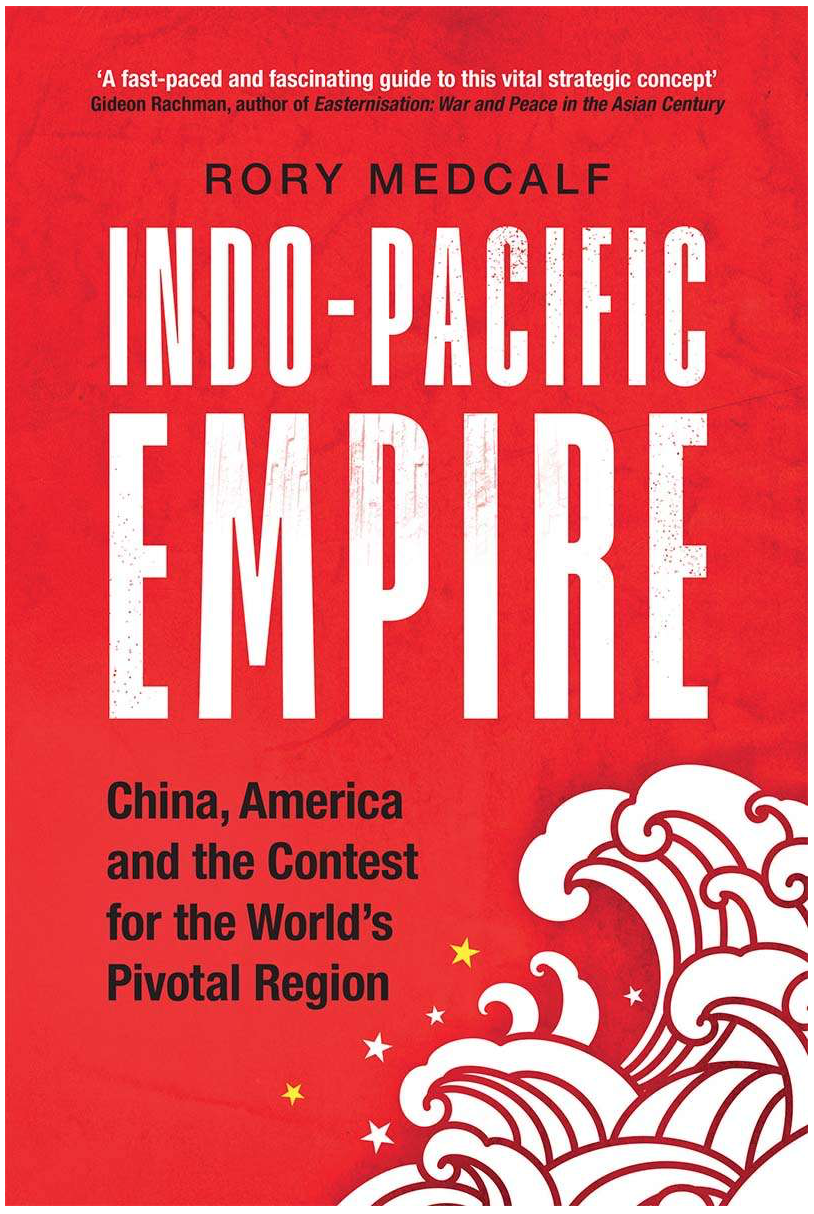 In 2016, Prime Minister Abe of Japan and his Indian counterpart, Narendra Modi, took a trip on the bullet train between Tokyo and Kobe to visualise the birth of a new era of bilateral cooperation. On the basis of this anecdote, Rory Medcalf offers the reader a reconceptualisation of the world's most dynamic region that leaves behind the one that, due to American influence, has for some time dominated under the label 'Asia-Pacific', and which does not reflect a broader geopolitical reality.
In 2016, Prime Minister Abe of Japan and his Indian counterpart, Narendra Modi, took a trip on the bullet train between Tokyo and Kobe to visualise the birth of a new era of bilateral cooperation. On the basis of this anecdote, Rory Medcalf offers the reader a reconceptualisation of the world's most dynamic region that leaves behind the one that, due to American influence, has for some time dominated under the label 'Asia-Pacific', and which does not reflect a broader geopolitical reality.
The degree scroll of the book is somewhat misleading, as it seems to allude to eventual world dominance from the Indo-Pacific region, and the struggle of China and the United States for it. This is not what the book offers.
For Medcalf, an Australian who has spent many years working in his country's foreign service, "Indo-Pacific" is an alternative geopolitical concept that encompasses a vast and eminently maritime region comprising the Pacific and Indian Oceans, through which most global maritime trade flows, as well as the coastal territories connected by both seas. At the centre of this immense and diverse space are Australia, acting as a sort of hinge, and the area of Southeast Asia that includes the Strait of Malacca, a vital maritime passage.
The proposed geopolitical approach serves as an argument for articulating a regional response to China's growing and increasingly threatening power that does not involve confrontation or submissive capitulation. In the author's words, it is an attempt, made from a liberal point of view, to counter China's desire to capitalise on the region to its advantage.
In this sense, Medcalf's proposal is about the region's middle powers - India, Australia, Japan, Korea, Indonesia, Vietnam, etc. - achieving greater coordination to shape a future that takes into account China's legitimate interests, but in which these powers effectively balance Beijing's power. The future of the region must be designed with China, but not imposed by China. Nor by the United States, which is nevertheless recognised as an actor core topic in the region, and whose support the author is counting on to flesh out the idea.
The book follows a chronological storyline with three distinct parts: past, present and future. The first part sets out the historical reasons for considering the Indo-Pacific as a region in its own right, and sample the shortcomings of the "Asia-Pacific" view.
presentation The present block is descriptive in nature and briefly describes the main actors on the Indo-Pacific stage, China's growing military power, and how China is using it to return, reminiscent of the time of the Chinese navigator Zheng He, core topic to the Indian Ocean, which has now become an arena of geo-economic and geopolitical confrontation, as well as an important part of China's economic growth as a route for the resources the country needs, and as a maritime part of the global project of the new Silk Road.
As for the future, Medcalf offers his proposal for the region, based on a geopolitical outline in which Australia, of course, occupies a central place. On a scale ranging from cooperation to conflict, through coexistence, competition and confrontation, the author argues for the coexistence of the Indo-Pacific players with China, and proposes actions in the three areas of promoting development in the countries most vulnerable to Chinese influence - and in some cases Chinese extortion; Deterrence, in which the United States will continue to play a central role, but which cannot be based exclusively on its nuclear power, but rather on the growth of the military capabilities of the countries in the region; and diplomacy, exercised at various levels - bilateral, multilateral, and "minilateral" - to generate mutual trust and establish norms that avoid an escalation towards confrontation and even conflict.
These three instruments should be accompanied by the internship of two principles: solidarity and resilience. The former seeks a greater capacity to manage China's rise in a way that promotes a balance between balancing power and rapprochement, avoiding the extremes of containment and accommodation to the giant's designs. Second, the region's states are becoming more resilient to China's power and more capable of recovering from its negative effects.
There is no doubt that this geopolitical approach , which follows in the wake of Japan's "Free and Open Indo-Pacific" policy, is made from a distinctly Australian perspective and that, consciously or not, it enhances the role of this continent-nation, and serves its particular interests in defining its place in the world and maintaining a secure and stable environment in the face of an increasingly threatening China.
While recognising this motivation, which is a logical consequence of applying the old concepts of realism, the proposal vision is not without merit. For one thing, it allows China to be conceptualised in a way that captures the interest in the Indian Ocean as integral to China's view of itself in relation to the world. For another, it serves as a wake-up call, both to the many Asian middle powers and to the small Pacific island states, about the Chinese threat, offering the manna of an alternative to conflict or uncritical submission to the Chinese giant. Finally, it incorporates - at least conceptually - the United States, together with India and Japan, into a multinational effort capable, given the economic and demographic weight of the participants, of balancing China's power.
If the intention of the concept is to foster awareness in the region of the need to balance China's power, then it can be argued that the overly Australian-centric proposal completely omits China's land dimension, and the desirability of incorporating into that balance other regional middle powers that, while not among the maritime powers, share with them a fear of China's growing power. Similarly, although the coastal nations of Africa and the Americas might be thought to form an integral part of the entity defined by the Indo-Pacific basins, they are conspicuously absent from the geopolitical design , with the exception of the United States and Russia. References to Africa are rare; Central and South America are simply unnamed.
It is, at final, an interesting work that addresses an important global issue from a novel, realistic and considered perspective, without falling into doomsday scenarios, but opening a door to a somewhat hopeful future in which a China that is dominant but whose power, it is argued, may already have reached its peak, can give rise to the flourishing of a shared space at the heart of a reconnected world in a way that the ancient navigators could not even have imagined.
[Barack Obama, A Promised Land (discussion: Madrid, 2020), 928 pp.]
review / Emili J. Blasco
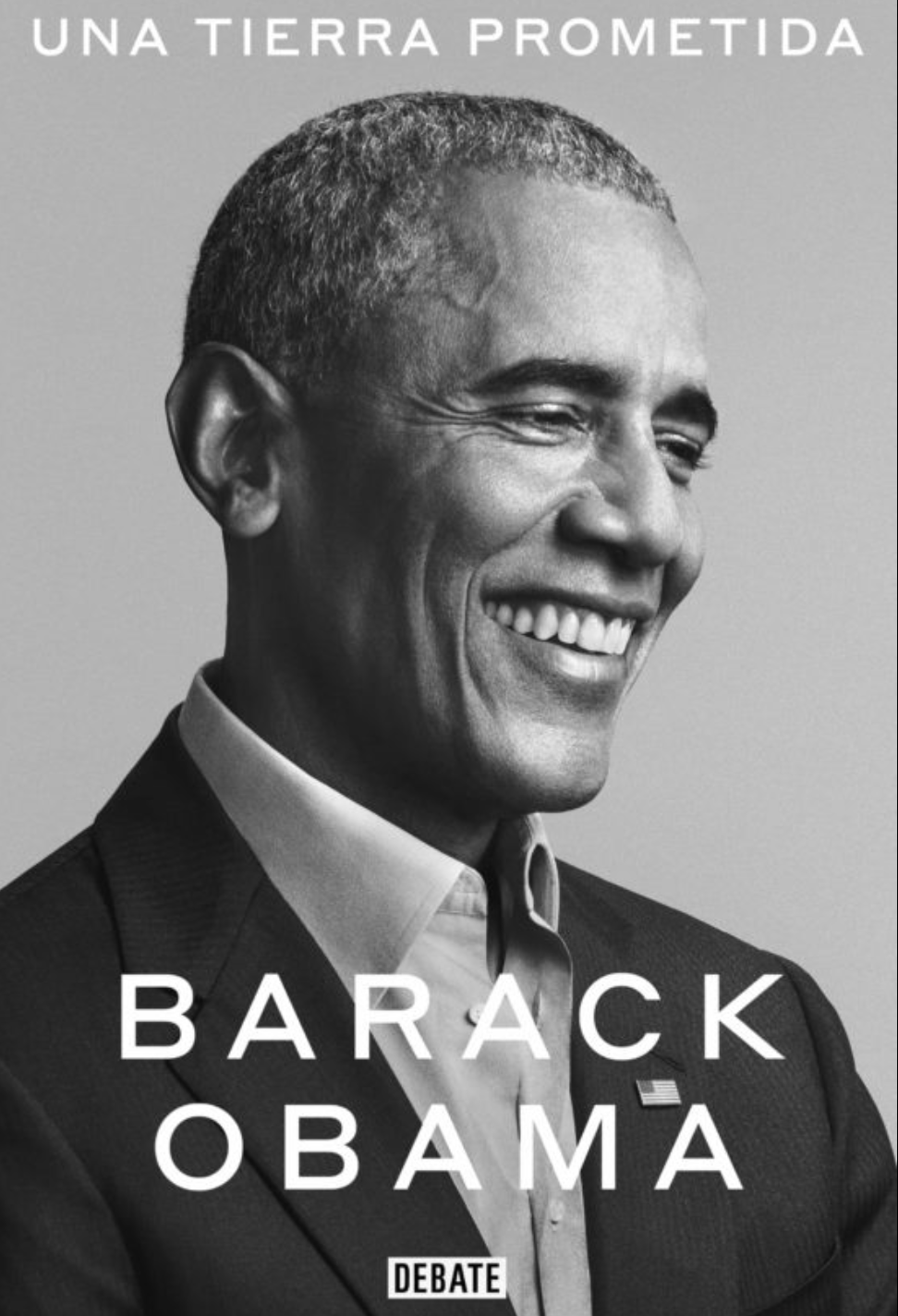 A president's memoirs are always an attempt to justify his political actions. Having employee George W. Bush used less than five hundred pages in "Decision Points" to try to explain the reasons for a more controversial management in principle, that Barack Obama used almost a thousand pages for the first part of his memoirs (A promised land The fact that no US president has ever required so much space in this exercise of wanting to tie up his bequest.
A president's memoirs are always an attempt to justify his political actions. Having employee George W. Bush used less than five hundred pages in "Decision Points" to try to explain the reasons for a more controversial management in principle, that Barack Obama used almost a thousand pages for the first part of his memoirs (A promised land The fact that no US president has ever required so much space in this exercise of wanting to tie up his bequest.
It is true that Obama has a taste for the pen, with some previous books in which he has already demonstrated good storytelling, and it is possible that this literary inclination has won him over. But probably more decisive has been Obama's vision of himself and his presidency: the conviction of having a mission statement, as the first African-American president, and his ambition to bend the arc of history. As time goes by and Obama starts to become just another in the list of presidents, his book vindicates the historic character of his person and his achievements.
The first third of A Promised Land is particularly interesting. There is a brief overview of his life before entrance in politics and then the detail of his degree program to the White House. This part has the same inspirational charge that made so attractive My Father's Dreams, the book that Obama published in 1995 when he launched his campaign for the Illinois Senate (in Spain it appeared in 2008, following his campaign for the presidency). We can all draw very useful lessons for our own self-improvement staff: the idea of being masters of our destiny, of becoming aware of our deepest identity, and the security that this gives us to carry out many enterprises of great value and transcendence; to put all our efforts into a goal and take advantage of opportunities that may not come again; in final, to always think outside the box (when Obama saw that his work as senator of Illinois had little impact, his decision was not to leave politics, but to jump to the national level: He ran for senator in Washington and from there, just four years later, he reached the White House). The pages are also rich in lessons on political communication and election campaigns.
But when the narrative begins to address the presidential term, which began in January 2009, that inspirational tone drops. What was once a succession of generally positive adjectives towards everyone begins to include diatribes against his Republican opponents. And here is the point that Obama is unable to overcome: giving himself all the moral credit and denying it to those whose votes in the congress disagreed with the legislation promoted by the new president. It is true that Obama had a very frontal civil service examination from the Republican leaders in the Senate and the House of Representatives, but they also supported some of his initiatives, as Obama himself acknowledges. For the rest, which came first, the chicken or the egg? Large swathes of Republicans were quick to jump on the bandwagon, as the Tea Party tide in the 2010 midterm elections soon made clear (in a movement that would eventually lead to support for Trump), but Obama had also arrived with the most left-leaning positions in US politics in living memory. With his idealistic drive, Obama had set little example of bipartisan effort in his time in the Illinois and Washington Senate; when some of his reforms from the White House were blocked in the congress, instead of seeking accommodation - accepting a politics of the possible - he took to the streets to pit citizens against politicians who opposed his transformations, further entrenching the trenches of one side against the other.
The British historian Niall Ferguson has pointed out that the Trump phenomenon would not be understood without Obama's previous presidency, although the bitter political divide in the United States is probably a matter of a deep current in which leaders play a less central role than we might suppose. Obama saw himself as ideally suited, because of his cultural mix (black, but raised by his white mother and grandparents), to bridge the widening rift in US society, but he was unable to build the necessary ideological bridges. Bill Clinton faced a similar Republican blockade, in the congress led by Newt Gingrich, and made compromises that were useful: he reduced ideological baggage and brought an economic prosperity that relaxed public life.
A Promised Land includes many of Obama's reflections. He generally provides the context necessary to understand the issues, for example in the gestation of the 2008 financial crisis. In foreign policy he details the state of relations with major powers: animosity towards Putin and suspicion of China, among other issues. There are areas with different possible ways forward where Obama leaves no room for a legitimate alternative position: thus, in a particularly emblematic topic , he charges Netanyahu without admitting any mistakes of his own in his approach to the Israeli-Palestinian problem. This is something that other reviews of the book have noted: the absence of self-criticism (beyond admitting sins of omission in not having been as bold as he might have wished), and the failure to admit that in some respects perhaps the opponent might have been right.
The narrative is well-paced internally, despite the many pages. The volume ends in 2011, at a random point in time determined by the anticipated length of a second submission; however, it has a sufficiently strong climax: the operation against Osama bin Laden, for the first time told in the first person by the person at the highest level of command. Although the Degree involvement of other hands in the essay of the work is unknown, it has a point of lyricism that connects directly with Los sueños de mi padre (My Father's Dreams) and which financial aid leads us to attribute it, at least to a large extent, to the former president himself.
The book contains many episodes of the Obamas' domestic life. Obama's constant compliments to his wife, admiration for his mother-in-law and constant references to his devotion to his two daughters might be considered unnecessary, especially as they recur, in a political book. Nonetheless, they give the story the tone staff that Obama has sought to adopt, as well as giving human warmth to someone who has often been accused of having a public image of being cold, distant and overly reflective.
